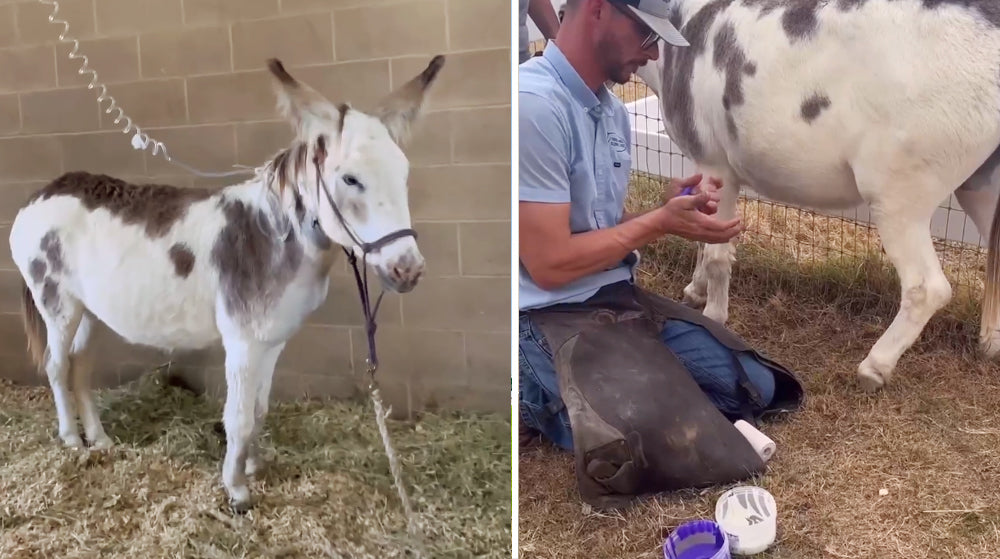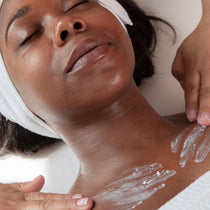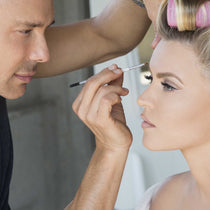Serious Stomach Upset
Brooks stopped eating
After breakfast this morning, we noticed Brooks laid down and left his food in the bowl. We've learned that for animals, not eating your breakfast is the first sign of immediate medical distress. We've also found it's barely ever mild. In equines you hear the term "colic" and that typically means "stomach upset." The standard protocol is to administer Banamine and wait an hour to see if they improve. This morning, we decided to break protocol and take him straight to the hospital.
Brooks has always been the most scared donkey we have in terms of allowing us to pet him, or work on his hooves. We think it's in part due to arriving to us and having his family torn away in the same weekend. Brooks came to the Sanctuary in starved condition, with dreadlocks hanging - he was so sick he couldn't shed his hair properly. He's part of "the spotted family"-- a threesome that came in together, only he quickly was alone here when his mom, Dolly, had to be hospitalized due to aggressive pneumonia. Dolly miraculously survived with a week of round the clock IV's, and returned with her baby back to the Sanctuary. But Brooks has always been shy of people.
He loves the donkeys and plays tug of war with his buddy Arlo for hours. So to see him lay like this and refuse to eat was shocking. To an outsider, no big deal, but to us, he was clearly in distress.

The hospital found his triglyceride levels were very high. His condition was serious because unknown to us, he'd not been feeling well for some time, and actually quit eating and drinking. He was dehydrated, and his body started using fat to stay alive. If we hadn't caught it, it could have shut down all his organs. It's called hyperlipaemia. Donkeys can get this from stress (the loss of a friend, from being transported, severe weather changes.... having a stomach ache...) so many stressors all affect donkey health greatly.
He had started feeling badly, right under our noses. Because donkeys are stoic - when they don't feel well - you often don't know. Horses show their pain immediately. If this had been a horse, the horse would lie down in a stall within minutes of feeling bad, and would be kicking their legs around and rolling. But a donkey-- nothing. They'll move with the herd and act seemingly normal. We caught his condition because we feed bowls of food every morning to monitor health and also to keep our animals in a routine of easy stalling for farriers and vet visits. So this morning, we were able to see he couldn't handle his discomfort anymore, and laid down.

At the hospital, he was administered Karo Syrup! Yes! Gobs and gobs of syrup were syringed down his throat, so his body would start using the sugar, instead of his body's fat. He had round the clock IV's.
Pain transferred to the hooves
When he was released, his hooves hurt so much he could barely walk normal. Dr. Metcalf came and made "dental impressions" of his hooves for him to wear for a week to provide comfort. And we moved Brooks to the Sheep house to live with our elderly donkey and sheep for a few days to restrict his movement as his body's levels normalized. Through this process, he also had several Xrays of his hooves to make sure the bones in his hooves didn't turn (laminitis).
After about a week, Brook was back out with his herd. He's also no longer shy! We think the combination of "Donkey Sanctuary Training" our team has been doing, combined with hospitalization that included getting treated with syrup, was the icing on the cake for Brooks! He started feeling better and has come to realize that all the people working with him are helping him.
Thank you so much for buying products you love. We were able to bring Brooks back from brink with your support and purchase of FarmHouse Fresh products! We couldn't do this live saving work without you!












